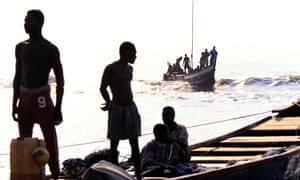https://www.theguardian.com/environment/2018/oct/16/drug-trafficking-at-sea-is-devastating-island-states-ministers-say
Drug trafficking at sea is devastating island states, ministers say
Ministers of island states call for help in tackling organised crime in the fishing industry, which they say is harming both the environment and human rights

Ministers from tiny island states including Palau, the Solomon Islands and Kiribati are calling for help over the “devastating” impacts of criminal networks in the fishing industry.
Fishermen, unable to work because stocks are so low, are being lured into gun-running and drug trafficking by international organised crime, the small island nations’ officials told an industry conference in Copenhagen this week.
Estimates of the scale of the problem varies, but the black market in marine wildlife including corals and reef fish in south-east Asia and the Pacific alone is worth US $850m (£625m), according to the UN Office on Drugs and Crime (UNODC). The actual costs of crime in the industry, which includes tax transgressions, human trafficking and other offences, is far greater.
A minister from Palau told the Guardian he believed the nation’s deepening crystal meth crisis was being fuelled by distant water fishing vessels involvement in the trade. In the Caribbean, where the value of fish has decreased due to overfishing, a coastguard spoke of “fishing canoes leaving Jamaica with marijuana and within 24 hours, coming back with weapons”.
In Ghana, children are being recruited and exploited as “hard labour” to work in canoes and boats, according to an environmental specialist from the country.
“Transnational organised crime in the fishing industry is a serious crime that disregards the rule of law, mocks our sovereignty and depletes our ocean resources,” said Mas Achmad Santosa, a member of the Indonesian taskforce to combat illegal fishing, who was speaking on behalf of Susi Pudjiastuti, the fisheries minister of Indonesia. It remains one of the biggest threats to ocean resources, by harming our environment and undermining human rights, he said.
The symposium, backed by the Norwegian ministry of trade, industry and fisheries, the United Nations Development Programme and the UNODC, refers to the developing island nations as “large ocean states” – an important distinction.
Gunnar Stølsvik, the policy director of the Norwegian ministry of foreign affairs, said that the definition was an “important shift” in the debate. While Kiribati itself is tiny – a collection of 33 atolls with a population of 110,00 people – the size of the ocean over which it has rights is the size of continental India. Palau has an area of ocean – or economic exclusion zone (EEZ) – measuring 500,000 sq km, roughly the size of France. The Faroe Islands has a zone the size of continental Italy.
Fleming Umlich Sengebau, the fisheries minister of Palau, told the conference: “To most of you, Palau is but a speck in the ocean … a dazzling speck, with pristine waters and coral reefs, but no less a speck.”
But, he said: “Our country extends far beyond the stretch of land.”
The Western Pacific nation had introduced measures to tackle overfishing, illegal fishing, wildlife poaching and organised crime, including declaring its waters a shark sanctuary and making 80% of its EEZ a marine sanctuary, where no fishing can take place. However, it only had two vessels to patrol its zone and three to patrol state waters.
“We still lack the technology and the financial means to fully support our oceans,” he said.
“Because of our close proximity to south-east Asia, we have seen cases from our neighbours of people trafficking and drug smuggling, which is becoming a big problem in Palau. We’ve found drugs coming from fishing vessels … We suspect boats coming from Palau go to meet fishing vessels in open water.
“To expect a small country like Palau to address this is impossible. We want the international community to help.”
Kiribati, an island which is disappearing under the ocean because of sea-level rise, sits within one of the best tuna fisheries in the world. Revenue from fisheries licences make up 70-80% of its GDP.
“Last year, we had more than 200 vessels enter and leave our waters,” said Tetabo Nakara, the fisheries minister of Kiribati. “But we have a limited capacity to monitor those waters.”
Harald Nesvik, the Norwegian minister of fisheries, said that nine countries – Norway, Sri Lanka, Palau, Faroe Islands, Kiribati, Solomon Islands, Indonesia, Namibia and Ghana – had signed a declaration on the need for international recognition of the problem. He added it was having a “serious effect on the economy, distorts markets, harms the environment and undermines human rights”. Ultimately, Norway wants to see a UN resolution recognising international organised crime in the fishing industry.
“This is a first step,” said Nesvik. “For the UN, the first step is to recognise that these things are happening. This is a battle we can’t afford to lose.”
The conference was hosted by the Norwegian Ministry of Trade Industry and Fisheries and the Nordic Council of Ministers, and backed by the UNDP and UN Office on Drugs and Crime.

沒有留言:
張貼留言